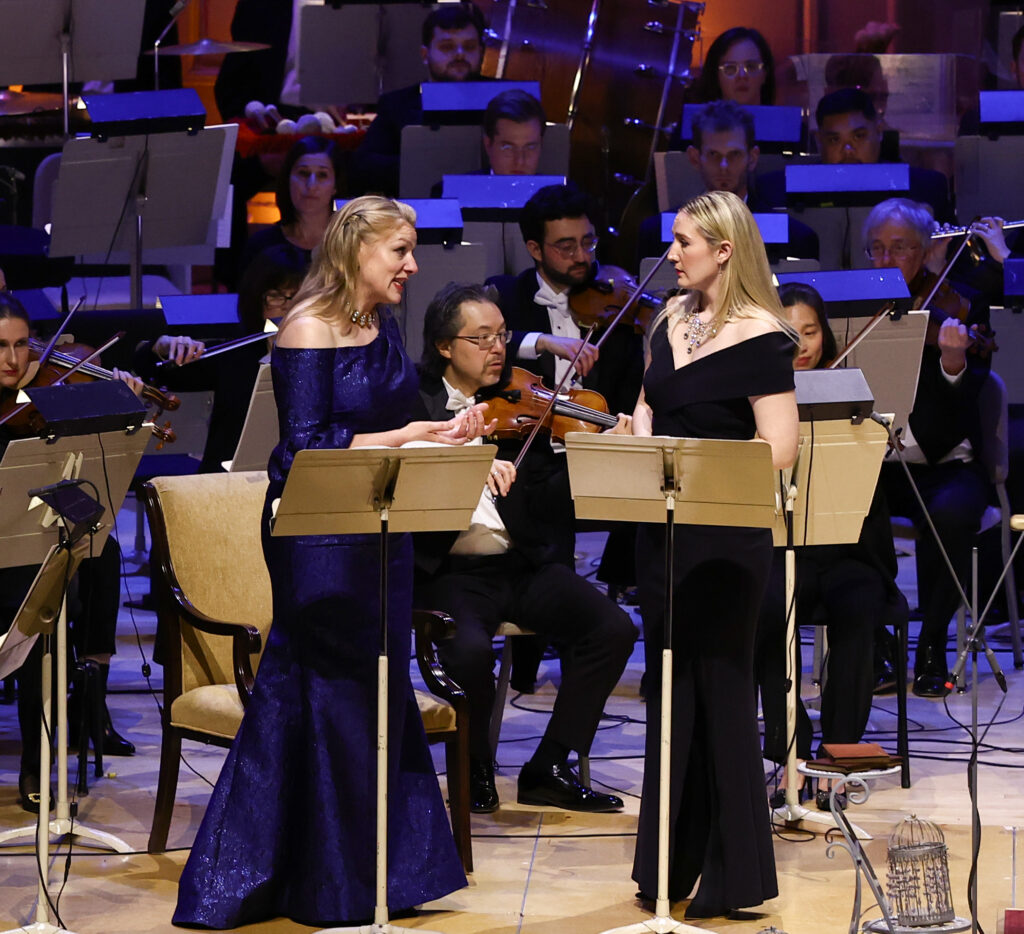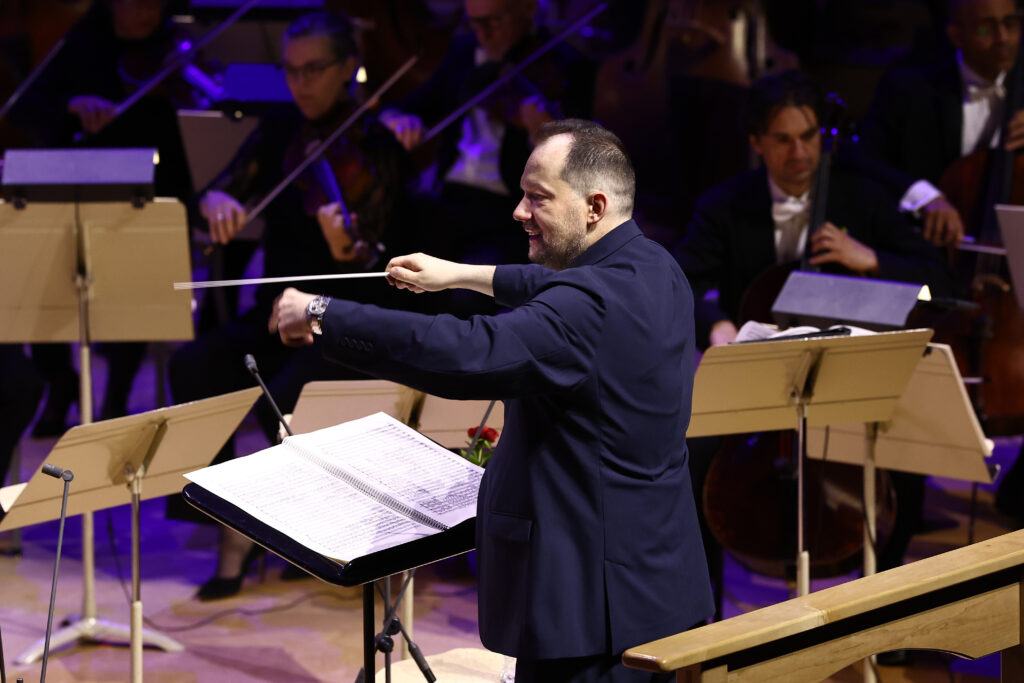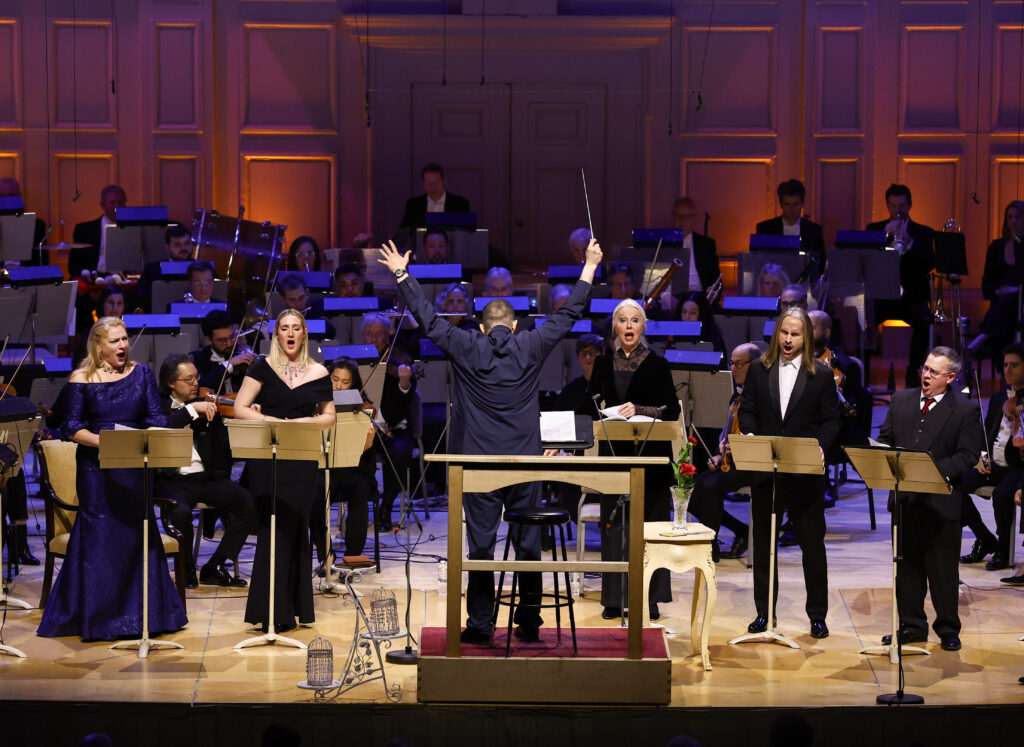Performances
Mäkelä, CSO wrap year with bracing contemporary works, Beethoven and Schumann
The final Chicago Symphony Orchestra program of 2025 offered much to […]
Grosvenor scales the heights with a trio of blockbusters for Chamber Music Maryland
Chamber Music Maryland brought Benjamin Grosvenor back to the Horowitz Center […]
Florida Grand Opera’s “Silent Night” proves a rich and moving tale of common humanity
This has been a virtual American opera week in Miami. Following […]
Opera review
Nelsons, cast and BSO give heartfelt and idiomatic advocacy to Barber’s “Vanessa”

Happiness, George Burns once quipped, is having a large, loving, caring, close-knit family in another city.
Samuel Barber’s Vanessa showcases an alternative: the opera, with its libretto by Gian Carlo Menotti, presents a study of three women—a mother, daughter, and niece—living together under one roof in various states of misery, disappointment, and longing.
Premiered in 1958, the score netted Barber a Pulitzer Prize—though its chilly reception at the Salzburg Festival later that year presaged a dip in both the opera’s and the composer’s popularity. Nevertheless, Vanessa, which the Boston Symphony Orchestra presented in conjunction with Boston Lyric Opera on Thursday night at Symphony Hall, is nothing if not a near-ideal pairing of music and subject matter.
Its narrative traces the uneasy relationships between Vanessa, her niece Erika, and their mother/grandmother the Old Baroness over the course of several months during the winter, circa 1905. When the curtain rises, the title character is awaiting the return (after an inexplicable twenty-year hiatus) of her paramour, Anatol. He doesn’t show—Old Anatol is, in fact, dead—but his son, also named Anatol, does. When Vanessa runs off in shock and confusion, Anatol fils proceeds to seduce and impregnate Erika.
Erika, whose parentage is left vague, responds with a mix of conflicting emotions but also some insight into Anatol’s capricious character; she turns down his marriage proposal. Eventually, Vanessa and Anatol announce their engagement and Erika, distraught, runs out into the cold winter’s night where she suffers a miscarriage. At opera’s end, the happy couple, now married, ship off to Paris, while Erika—who refused to divulge the exact nature of her relationship with Anatol to Vanessa—holes up with the Old Baroness in her gloomy manor house.
In response to this echt-soapy plot, Barber concocted a score of extraordinary variety and depth. Sometimes thick and sumptuous, sometimes light and playful, always evocative and tightly constructed, this is a work—heard Thursday in the three-act, 1964 revision—that stands as a powerful testament to the composer’s technical brilliance and, by and large, his firm command of theater.
Vanessa is very much steeped in the 20th-century operatic mainstream: nods to Strauss, Puccini, and Berg proliferate, though there’s nothing derivative about Barber’s writing in it. Instead, the tragedy stands as a striking marriage of an old form with a fresh context. Its moral—that clinging too much to the past robs one of the ability to shape one’s future—is ever-timely.
As such, Barber’s opera made for an excellent kickoff to the BSO’s month-long E Pluribus Unum festival, which seeks, as a note in the program book put it, to explore the “kaleidoscope of voices and viewpoints at play” in American music and art. It was also a terrific showcase for the orchestra, which had never performed Vanessa before, and music director Andris Nelsons.
Nelsons isn’t a conductor one immediately associates with the core American canon, though he’s led a handful of works by Barber in the course of his directorship. On Thursday, the Latvian maestro seemed perfectly at ease with the 20th-century icon’s larger style and syntax.

Tempos were judicious, orchestral colors vivid, and the music’s sense of texture and space—both within the ensemble and between on- and off-stage forces—proved gripping. As usually happens in these opera-in-concert events, balances between orchestra and voices were periodically haphazard and Barber’s involved writing sometimes came over blurrily.
Even so, there were moments of extraordinary delicacy and beauty to be had. The sotto voce string textures in Act 1’s “Do not utter a word” were exceptionally focused and the gorgeous Act 3 Intermezzo was a thing unto itself. Throughout the night, the orchestra’s woodwind and horn sections clearly reveled in Barber’s voluptuous scoring.
The production’s vocal star was mezzo-soprano Samantha Hankey, whose depiction of Erika ably captured the character’s mix of strength and naïveté. Singing with lustrous tone, pinpoint diction, and effortless projection, the Massachusetts native commanded the stage, visually and musically, whenever she was on it.
Hankey evinced a good rapport, too, with soprano Jennifer Holloway’s Vanessa. Though the latter’s singing didn’t always carry over the opera’s thickest, busiest textures, she and Hankey lit sparks in Act 1 and the pair’s concluding scene in Act 3 was touching.
Tenor Pavel Černoch had originally been slated to sing the Pinkerton-esque Anatol but was sidelined by illness. In his place, the BSO enlisted Ganson Salmon, whose command of the notes seemed complete. Unfortunately, his voice was almost comically underpowered and couldn’t hold its own with the orchestra even when that group was playing softly. Additionally, the discrepancy between the character’s required charisma and the soloist’s lack thereof lent parts of this Gothic tragedy an unexpectedly humorous tinge.
Illness also claimed Thomas Hampson, who had been announced to portray the Old Doctor. Bass-baritone Patrick Carfizzi, however, stepped in and, by accident or design, impressively channeled the older singer’s aristocratic tone and crisp enunciation. He brought welcome—and intended—lightness, especially to his character’s Act 2 scenes.
Anne Sofie von Otter conveyed the Old Baroness’s haughtiness with eerie naturalness, both by her singing—at 70, the Swedish mezzo-soprano still has an impressive instrument—and icy stage presence. Bass Wei Wu was a stentorian Major Domo/Footman.
The Tanglewood Festival Chorus and BLO Chorus (prepared, respectively, by Betsy Burleigh and Brett Hodgdon) acquitted themselves with aplomb. Though Barber’s choral writing in Vanessa isn’t extensive, the groups’ appearances from the first-floor lobby were tonally robust and rhythmically agile.
Alexandra Dietrich’s staging made better use of Symphony Hall’s limited resources than not, moving the soloists regularly, though not distractingly, around the podium. The commensurate distance between Nelsons and the instrumentalists might explain a few of the night’s instances of ragged ensemble.
Still, any shortcomings hardly distracted from Thursday’s great reminder that there’s so much more to Barber than the Adagio for Strings. Vanessa’s warnings about living too much in the past are, more generally, about complacency. Only time will tell how many lessons in programming and repertoire the BSO might take to heart from this month’s fête. But, at the very least, their year is off to a promising start.
The program will be repeated 8 p.m. Saturday at Symphony Hall. bso.org
Articles
No slowing down for Gerard Schwarz, South Florida’s busiest conductor
When Gerard Schwarz was a teenage trumpet student, he dreamed of […]
Opera creators find the light of love amid the horror of “The Shining”
In their adaptation of Stephen King’s iconic 1977 novel The Shining, composer […]
News
Patrick Quigley to depart Seraphic Fire in 2026; James Bass will be his successor
The Seraphic Fire torch is being passed. Patrick Dupre Quigley, founder […]
Subscribe
![]() Subscribe via RSS
Subscribe via RSS
![]() Follow on Twitter
Follow on Twitter
